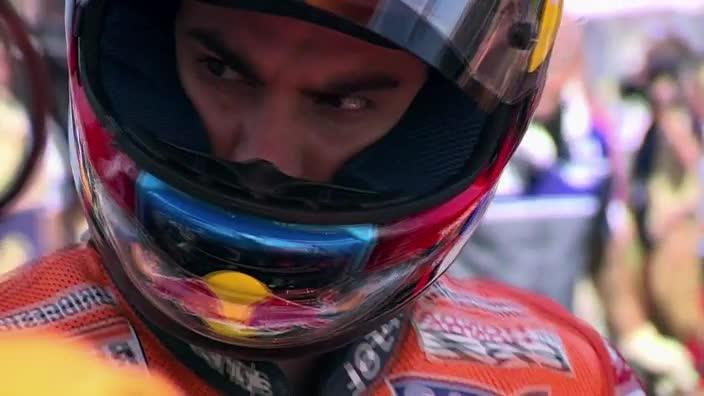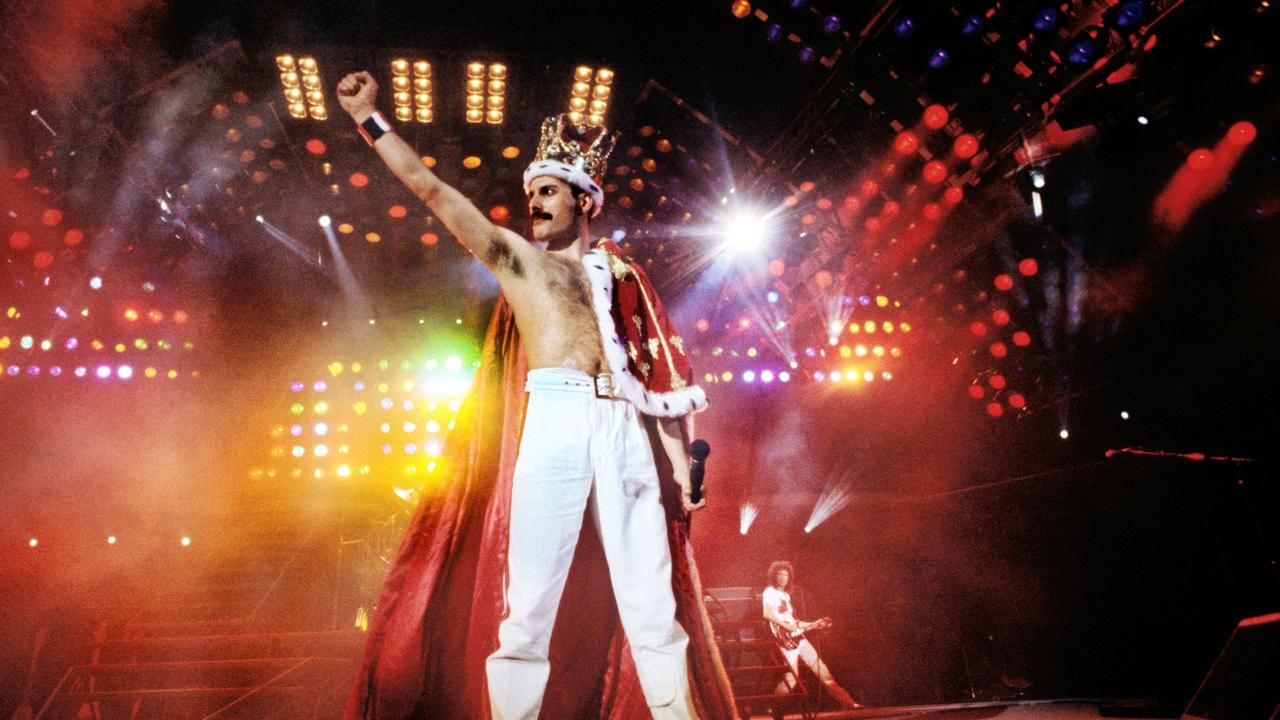Brad Pitt doco on motoGP keeps film career on track to longevity
Brad Pitt talks motorbikes, middlemen and the drive to make more films.

A phone call interrupts another sleepy morning at the office desk.
“Hi, it’s Brad,” chirps the caller.
“What?” blurts the Australian journalist still propping his head in front of a computer screen full of the morning’s blah.
“Brad Pitt. We…”
“Right. Of course,” I stumble, apologising clumsily that indeed his call was expected and, despite appearances, the receiver is not another too-casual Australian. It’s just that these phone calls tend to be highly choreographed enterprises, timed to the minute and connected by a personal assistant or publicist, most of whom then monitor the tone of the conversation.
“No, I dial myself,” Pitt says. “It cuts out the middle man.”
It is a rather obvious metaphor for Pitt’s status. During a period in which the Hollywood studios have wrested some power back from the stars — or at least the financiers and audiences have shifted their preference to films featuring familiar characters or books rather than familiar movie stars — Pitt is sitting comfortably.
The American continues to mix the big acting paydays, such as World War Z and the coming adaptation of Michael Lewis’s book about the US banking collapse of the mid-2000s, The Big Short, with more esoteric collaborations such as the drama By the Sea, which co-stars his wife, Angelina Jolie, and is due out shortly, and Terrence Malick’s The Tree of Life and its coming offshoot, Voyage of Time . And he is the Academy Award-winning producer of 2013’s best motion picture, 12 Years a Slave.
It represented an early zenith for Pitt the producer as his company Plan B Entertainment underscored its credibility as a generator of quality, socially significant projects.
The searing period drama about the 1841 abduction of a free black man from Washington, DC, was more than a worthy film; it was the first best picture winner to be directed and produced by a black filmmaker (Britain’s Steve McQueen) and written by an African-American (John Ridley). As an aside, Plan B, which Pitt runs with Dede Gardner and Jeremy Kleiner, received the Producers Guild of America’s 2015 Visionary Award earlier this year.
So, how does producing the best picture Oscar winner change things? Pitt chuckles. “I’m not being egotistical but I think we made the best picture a couple of times before, so I can’t say. But it was more about getting 12 Years a Slave out here, which was part of our bleakest history and yet we didn’t talk about it that way,” he says.
“It was very strange there were no films made since Roots, which was a teleplay, and it took a Brit, Steve McQueen, to say: how come there’s no movies about American slavery? We didn’t say it.”
A testament to his early achievements is the number of the films he has produced that had credible claims to the best picture Oscar (he has a producer’s credit on Martin Scorsese’s The Departed , but only one producer, Graham King, was awarded the top prize).
His productions Moneyball and The Tree of Life had their dedicated supporters when they were pipped for the top Oscar by The Artist in 2012; and last year the Martin Luther King Jr tale Selma was a much admired best-picture nominee but was trumped by Birdman. Meanwhile, Plan B’s adaptation with Ryan Murphy of Larry Kramer’s seminal AIDS stage play The Normal Heart won an Emmy award as outstanding television movie last year.
The accolades grow, but Pitt’s outstanding achievement as a producer, which made the industry sit up and take notice, was his success in salvaging the 2013 zombie drama World War Z. The film, which features Pitt as a UN investigator trying to halt a zombie pandemic, encountered a litany of travails, including reshoots, issues with its director, Marc Forster, the lack of a final act, rewrites and the public airing of all its troubles in a prominent Vanity Fair article. Its budget ballooned by 50 per cent to $US190 million. Yet a late change to the third act resulted in a blockbuster and led to a sequel quickly being commissioned.
Pitt is no longer just an actor for hire but a bona fide producer with numerous projects in various stages of development. He seems very content wearing a producer’s fedora.
“Yeah, I’m very comfortable,” he says. “I quite like it, actually.”
He refers to Australian motorbike rider Casey Stoner, one of the subjects of the new documentary about the MotoGP circuit and its biggest contemporary personalities, Hitting the Apex. Pitt identifies with the dual world champion who abruptly quit motorbike racing in 2012, citing his weariness with the political machinations of the sport.

“Going back to Casey, you just want to be a part of the purity of the race and not all the side show that went with it,” Pitt says of the divide between his on-screen and off-screen lives.
“The dog-and-pony show of it all, the endless press requirements and the constant attention and bloggers and opinion — I completely understand what Casey objected to.”
For Pitt — whose marriage with Jolie remains Hollywood’s most glamorous if, for many, frustratingly private — the sideshow is tiresome. You sense the relief as he enthuses about the process of creation and documenting his true love, motorbikes.
“And producing, you’re behind the camera, you buy material, you develop the material, you put all the pieces and the talent together to tell that material, you edit that material, you fight for its release and how it’s going to be shown, and I quite enjoy that,” he says.
“You do everything and work on the story, which I love [doing], without really having to put your prosthetics and make-up on.”
Late last year, Jolie told The Weekend Australian she was almost done with acting, saying: “I’m sure I’ve got a few more in me but I’d be very happy to say goodbye to that part of my life … [and] unless I’m sure there’s a role or something I should do or [which] really means something to me, I’d rather spend my time telling stories from behind the camera.”
Surely one of cinema’s most alluring personalities isn’t feeling the same way?
“Not directing, but certainly I’m older now and want to spend more time with my family, and I get to do that through producing, so yeah I’m peeling back,” he says.
The couple seemed to relish the intensity of the creative process of By the Sea, a tale of a troubled marriage that Jolie describes as “a very heavy, dramatic film, and that had its own very unusual set of challenges”.
“To direct myself was hard. To direct him was a challenge,” Jolie says of Pitt. “And to be in scenes with him doing very, very heavy drama was difficult.
“But it was also a really great pleasure for us both to bust out of our comfort zones and go back to just being actors who work and fight through scenes, and figure it out and not be safe and not be sure, and try and push.”
The film, which Pitt’s Plan B produced, continues the company’s not-so-modest trajectory and Pitt’s desire to develop and create rather than just act. Plan B has a broad slate of projects ranging across size and genre, including the war satire War Machine, which is being directed by David Michod, the Australian director of Animal Kingdom, and will be released through the streaming platform Netflix.
Pitt acknowledges Plan B has a curious slate. “It’s by design, in the sense that we wanted to be a garage band that champions filmmakers that we believed in and material that we felt was challenging,” the 51-year-old says.
“So we kind of followed those directions with the divining rod. The package is not designed, we’ve just kind of gone where we found those opportunities.”
Hitting the Apex is one of those opportunities, a pleasing diversion that reflects one of his passions. Pitt narrates and produces the film by Mark Neale documenting the scintillating 2011-13 MotoGP seasons and the feuds among the disparate personalities driving those seasons: Valentino Rossi, Marc Marquez, Jorge Lorenzo, Dani Pedrosa, Marco Simoncelli and Stoner.
Just this week, Rossi underlined his brilliance and volatility when, during the Malaysian Grand Prix, he kicked Marquez off the track during a mid-race fight. His penalty — being assigned to the back of the grid in this weekend’s title-deciding final race in Valencia — all but lost him the chance for his seventh championship, as he currently leads Lorenzo by seven points in the championship.
Hitting the Apex establishes the scene, explaining the eclectic backgrounds, temperaments and styles of a band of highly skilled riders and their thrilling duels. Two Italians, three Spaniards and an Aussie walk on to a racetrack. All hell breaks loose.
Documenting it was easy, at least for Pitt; MotoGP is Pitt’s true sporting love (Neale nearly went bankrupt twice before Pitt’s company saved the day).
He started riding as a child. “I grew up in kinda Mark Twain country of the US [Missouri] with a lot of fields and a lot of kids with dirt bikes, a lot of cousins with dirt bikes,” Pitt recalls. “My dad [who owned a transport company] had ridden bikes, so it wasn’t foreign.”
As far as MotoGP is concerned, he says “I don’t think I’ve missed a race since 2001”.
“I got hip to it in the 90s, during the [Mick] Doohan era and got to meet Doohan a couple of years ago back when my wife was directing her film (war drama Unbroken) over there in your lands, and it was fantastic,” he says of the Australian rider who won five consecutive 500cc World Championships from 1994.
Pitt says he “really got religious” about the sport around the time Rossi started winning in the early 2000s. His suitability for, and attraction to, the project was obvious once a mutual friend put him in touch with Neale.
The latter, who had once made music videos for U2 and Paul Weller, forged a solid documentary career with films such as No Maps for These Territories, which showcased cyberpunk author William Gibson, and earlier forays into MotoGP, Faster and Fastest, narrated by another bike nut, Ewan McGregor.
McGregor was trying to develop a MotoGP drama for film with Neale before Pitt’s Plan B was “up and running and pretty strong, and he came to us just to make the ride a little simpler”, Pitt says.
“And for me it was a no-brainer, a lovely thing to work on, a lovely thing to be a part of,” he adds.
“I talk about this race every weekend, so it was a way to say thank you to the sport I love.”
“I feel for the documentarian,” Pitt adds. “They put in four years into a film and each month they’re spending their last dime, getting more money to put the pieces together. It’s a very dedicated profession.”
Neale wanted to focus on the seasons from the end of 2010 to 2013 because of the changing of the guard among riders and bikes, with Rossi’s abysmal jump from Yamaha to Ducati and Stoner’s retirement, Pitt says, “at the top of his game when he certainly had another championship or two in his pocket”.
The film documents Rossi’s failure and revival, entwined with the arrival of Marquez and counterpointed by the tragic death of Simoncelli. Pitt says he was moved by the riders on whom the film focuses. The film aimed to define the education of a rider from child to world champion and focus on the “mythology” of each rider.
“We follow this sport religiously and are into the weekly drama on Friday and Saturday and into the race on Sunday,” Pitt says.
“And the mythology that every man on that grid has their own fights, it’s something I especially love about the sport, which is a team sport right up until race time — and when the red lights go out you know it’s very much an individual sport.
“And not just an individual sport fighting the other guys on the track, but you’re also fighting yourself. It’s a battle of the mind as well as the physical ability.”
Pitt says the internal battle of each rider helps to define how well they perform. Each rider, in their summation of why they do it, points to broader philosophies and how they want to define their lives.
Pedrosa, for instance, is very forthcoming about the regret of a singular moment on which his career seemed to pivot, yet sanguine about his knowledge of how that transformed his life.
“I find it the very truest to this sport, specifically to this sport,” Pitt says.
Then there’s the rhythm and beauty of a fine race, as anyone who witnessed last week’s staggering Malaysian GP would appreciate. Pitt describes the riders’ talent as similar to the one-man band playing the trumpet with one hand, the guitar with another while the foot’s playing the drums and knees the cymbals.
“And the mental choices that have to be made in a millisecond are so extraordinary and it can only come from decades of hard work and thousands and thousands of kilometres on the track,” he says.
“Every appendage has got to be working, and working in harmony, on top of throwing your body weight around,” the fan and producer enthuses. “It’s quite a beautiful balletic feat — at 200 miles per hour.”
Hitting the Apex is out on DVD and digital from November 5 through Universal Sony Pictures Home Entertainment.
By the Sea is in cinemas from November 26.


